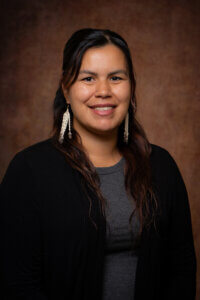By Linden Stackiokas
 Amber Demit-Albert is one of those lucky people who knew from an early age just what she wanted to do with her life: work in the medical field. At first, she thought this would mean becoming a nurse. Then she saw the opening for a health aide in Northway, the village where she was raised and still lived. It would mean traveling to Fairbanks for training, sometimes for a month at a time, but with her husband’s urging and support, she applied.
Amber Demit-Albert is one of those lucky people who knew from an early age just what she wanted to do with her life: work in the medical field. At first, she thought this would mean becoming a nurse. Then she saw the opening for a health aide in Northway, the village where she was raised and still lived. It would mean traveling to Fairbanks for training, sometimes for a month at a time, but with her husband’s urging and support, she applied.
The book learning was very detailed and challenging, even for someone who had always done well in school. But by August 2023, Amber was one of three health aides in Northway, a village of close to 300 people, located 40 miles from the Canadian border. The people she had known all her life, many of whom were relatives, were now patients she saw at the clinic. Amber became accustomed to the confidentiality requirements of the job, knowing that privacy was important to gaining the trust of patients.
The job of a health aide turned out to be all that Amber had hoped. She loved the work and helping the community where she grew up get healthy and stay healthy. Because she was from the village, she already had a basis for connecting with people, which made becoming their health care provider easier in some respects. The scariest part of the job, especially when she first started, was being on-call and thus solely responsible for handling emergencies. But that has become easier with time and experience. She has learned to trust the backup she has from Fairbanks doctors and the women she calls her “two amazing coworkers.”
Between being a health aide and tending to her eight children ranging in age from 4 to 21 years old, Amber does not have a lot of free time. She is especially appreciative of her 9 am to 3 pm schedule, which gives her extra time at home with family and sharing the yearly labor-intensive seasonal activities of moose hunting, fishing for white fish, and ice fishing. When she does have spare moments, she likes to sew and do beadwork. “And I love to travel,” she says. “I love warmer places, like Palm Springs, Florida, and Hawaii.”
The job of a health aide is not something a person does alone. Among her strongest supporters, Amber lists her husband who has encouraged her since the first steps into her profession; her mother-in-law who is always there for her children when Amber goes off for training for long periods; and her aunts who are always there when they are needed. Whether she must leave in the middle of the night for an on-call emergency or be gone for weeks in Fairbanks, they keep things going on the home front so she can concentrate on her job.
Asked what advice she might give to someone considering becoming a health aide, Amber says she would urge them to not be intimidated but to learn about the process. The program is designed to provide knowledge in small doses, so the facts and techniques are less intimidating to learn. She would remind them that it is a unique privilege to know enough to be able to help people in their worst condition during their greatest hour of need. At a more practical level, health aides will always be needed so there is job security. The benefits are good and the staff and supervisors at Tanana Chiefs are supportive. Finally, going through the training means that participants end up bonding with other health aides starting out. After the trainings, when these new friends have moved on to jobs in various villages, they can still be reached out to for support and reassurance.
Amber does not expect anything in her life to change soon. She looks forward to many more years of flying off to warmer places but always coming home to the life and people of Northway.
